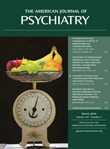Combination of Antidepressant Medications From Treatment Initiation for Major Depressive Disorder: A Double-Blind Randomized Study
Abstract
Objective
Various classes of antidepressant medications generally induce remission of major depressive disorder in only about one-third of patients. In a previous study using mirtazapine or paroxetine alone or in combination from treatment initiation, the rate of patients who remitted within a 6-week period was twice that of patients using either drug alone. In this double-blind study, the authors sought to produce evidence for the superiority of different combinations of antidepressant drugs from treatment initiation.
Method
Patients (N=105) meeting DSM-IV criteria for major depressive disorder were randomly assigned to receive, from treatment initiation, either fluoxetine monotherapy (20 mg/day) or mirtazapine (30 mg/day) in combination with fluoxetine (20 mg/day), venlafaxine (225 mg/day titrated in 14 days), or bupropion (150 mg/day) for 6 weeks. The primary outcome measure was the Hamilton Depression Rating Scale (HAM-D) score.
Results
The overall dropout rate was 15%, without notable differences among the four groups. Compared with fluoxetine monotherapy, all three combination groups had significantly greater improvements on the HAM-D. Remission rates (defined as a HAM-D score of 7 or less) were 25% for fluoxetine, 52% for mirtazapine plus fluoxetine, 58% for mirtazapine plus venlafaxine, and 46% for mirtazapine plus bupropion. Among patients who had a marked response, double-blind discontinuation of one agent produced a relapse in about 40% of cases.
Conclusions
The combination treatments were as well tolerated as fluoxetine monotherapy and more clinically effective. The study results, which add to a growing body of evidence, suggest that use of antidepressant combinations from treatment initiation may double the likelihood of remission compared with use of a single medication.



